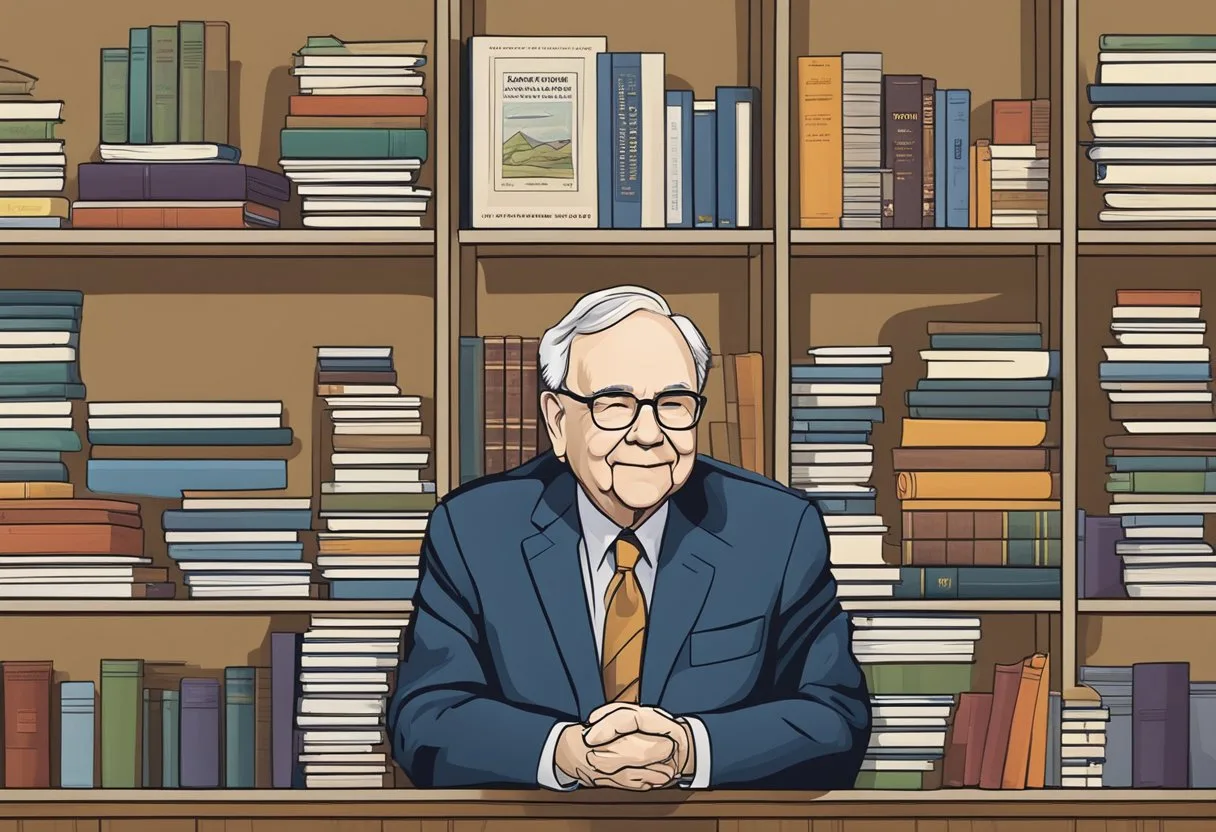There aren’t many people I find as inspiring as Warren Buffett, the famous chairman and CEO of Berkshire Hathaway. Yet he is known not only for his savvy investment skills but also for his incredible reading habits. The billionaire attributes a significant part of his success to the knowledge he has gained from reading. He suggests that reading 500 pages a day is key to building up knowledge that grows like compound interest. Fortunately Buffett has shared numerous book recommendations over the years. His annual shareholder letters provide insights into the reading material that has shaped his thinking on investment and business.
The books Buffett recommends give an inside scoop of the man’s brain, showing what has influenced his investment decisions. The books that helped him could help us to understand the wisdom he has accrued over decades in the financial world. Some of the themes include understanding a company’s value, the importance of managerial competence, and a long-term view on investment. I’ve only included the very top recommendations in this article.
Key Takeaways
- Warren Buffett’s substantial reading habit has greatly influenced his investment strategy.
- His book recommendations provide education on business acumen, economic understanding, and personal development.
- The recommended readings include various genres, reflecting the diverse sources of knowledge that Buffett has integrated into his investment philosophy.
Warren Buffett’s Approach to Reading
Warren Buffett, known for his abnormal success in the investment world, dedicates a considerable portion of his day to reading, which he credits as a fundamental factor in shaping his investment strategies.
Reading Habits and Routines
Warren Buffett spends about five to six hours per day reading five newspapers and 500 pages of corporate reports. Reading is a cornerstone of his daily routine. He often emphasizes its importance for gaining knowledge and maintaining a competitive edge. He starts his day diving into all sorts of financial papers and news articles to keep up with what’s happening in the business world.
Influence of Reading on Investments
The billionaire doesn’t only stick to financial statements and news. He also enjoys books, which have played a big part in his investment philosophy. He attributes much of his understanding of investing psychology and market fluctuations to the insights gained from books, suggesting they are essential for anyone seeking to succeed in investing.
Top Warren Buffett Book Recommendations
Warren Buffett, the esteemed investor and chairman of Berkshire Hathaway, endorses a selection of books that he believes offer deep insights into investing, business, and self improvement. These books are revered for the impact they have had on readers worldwide.
Investing and Business Strategy
1)”The Intelligent Investor” by Benjamin Graham: Buffett calls this, “By far the best book on investing ever written.” This book is lauded for its foundational guidance in the field of value investing—a strategy Buffett credits for much of his success.
2) “Poor Charlie’s Almanack: The Wit and Wisdom of Charles T. Munger”: A compilation that brings together the significant speeches and insights from Warren Buffett’s long-time business partner at Berkshire Hathaway, Charlie Munger.
3) “The Little Book of Common Sense Investing” by John C. Bogle: Buffett recommends this guide for its straightforward approach to investing by focusing on low-cost index funds, which is in line with his philosophy of simplicity and long-term growth.
4) Shoe Dog’ by Phil Knight, the founder of Nike: This comes highly commended by Buffett. It offers substantial guidance for young adults striving toward financial independence with wisdom gleaned from industry titans.
Biographies and Corporate Histories
5) “The Essays of Warren Buffett”: Curated by Lawrence Cunningham, this collection offers Buffett’s own thoughts on various aspects of business and investing, serving as both a biography and a corporate history.
Books about Bill Gates and Benjamin Graham have been mentioned as influential; their stories provide a historical backdrop for modern investing and philanthropy.
Personal Improvement
6) “How to Win Friends and Influence People” by Dale Carnegie: Buffett claims that Carnegie’s teachings transformed his life. He even took a Dale Carnegie course early in his career to overcome his fear of public speaking. In a documentary about Warren Buffett which I watched the other day, he says that the diploma from this course is the only one he hangs in his office,
Each book in this curated list gives readers a unique look at the expertise and philosophies of some of the most successful individuals in the business and investing world. They serve not only as instructional texts but also as a source of inspiration.
Investment Strategies and Principles
Warren Buffett is synonymous with successful investing, and his strategies are studied by investors around the world. This section unpacks the central tenets of his approach, focusing on the foundational aspects of value investing and his unique investment philosophy.
Value Investing Foundations
The cornerstone of Warren Buffett’s approach is value investing, a concept pioneered by Benjamin Graham. Value investing involves finding undervalued stocks that trade for less than their intrinsic value, offering a margin of safety. Graham’s book, “The Intelligent Investor,” is often regarded as the go to guide for value investors for its insights on market psychology, risk, and fundamental analysis.
- Essentials of Value Investing:
- Stocks represent ownership in a business.
- Focus on long-term growth rather than short-term gains.
- Seek out companies trading below their intrinsic value.
Buffett’s Investment Philosophy
Buffett’s key principles include a focus on long-term value, a willingness to invest in companies through tough times, and a commitment to businesses with strong competitive advantages. He emphasizes understanding a company’s fundamentals, management quality, and its competitive moat, or enduring competitive advantages that protect it from rivals.
- Buffett’s Investment Tenets:
- Business comprehension: Invest in what you know.
- Management quality: Invest in companies with honest and competent management.
- Financial health: Strong balance sheet and consistent earnings.
- Market opportunities: Favorable long-term prospects.
Investment Behavior:
- Patience: Adopt a long-term investment horizon.
- Discipline: Resist the market’s irrational behaviors.
Further Reading and Resources
Books on Berkshire Hathaway
The Essays of Warren Buffett: Lessons for Corporate America’ offers valuable insights into Berkshire Hathaway’s approach to investing and management. But there’s an even better approach to understanding Berkshire Hathaway…
Annual Reports and Letters
Berkshire Hathaway’s Annual Reports and Letters to Shareholders are a goldmine for anyone looking to fathom the depth of Warren Buffett’s investment mastery. I would prioritise reading these. Why read a book about these reports when you can read the reports themselves! Notably, Buffett’s letters are known for their clear language and encompassing insights on both the year’s performance and broader economic principles. You don’t need to be an expert to understand them. I was shocked at how understandable they are. They serve as a practical tool for financial education and an authentic record of Buffett’s thought process over the decades. Here are a few titles to whet your appetite:
1. Berkshire Hathaway Annual Report (1997) Buffett’s 1997 letter is a classic, where he delves into the concept of “owner-related business principles.” This report provides a clear view of Buffett’s approach to business and investing, emphasizing long-term value and transparency. It’s a great read for understanding how Buffett prioritizes shareholder interests.
2. Berkshire Hathaway Annual Report (2001) In the aftermath of the dot-com bubble, this report offers a straight forward analysis of the market’s irrational exuberance. Buffett discusses the importance of distinguishing between investing and speculating and reflects on the economic realities of the time, making it a relevant read for understanding market cycles.
3. Berkshire Hathaway Annual Report (2008) Amidst the global financial crisis, Buffett’s 2008 letter stands as a testament to his resilience and investment philosophy under pressure. This report is particularly insightful for understanding Buffett’s approach during economic downturns and his strategies for navigating financial turmoil.
4. Berkshire Hathaway Annual Report (2013) In this letter, Buffett shares valuable insights on the power of productive assets and the importance of understanding business fundamentals. It’s especially useful for investors looking to grasp the concepts of value investing and long-term wealth creation.
5. Berkshire Hathaway Annual Report (2019) This recent report offers a reflection on Berkshire Hathaway’s growth and evolution over the years. Buffett shares lessons learned and provides a broader perspective on the changing dynamics of the global economy, making it a must-read for modern investors.
Conclusion
Warren Buffett’s remarkable success is a clear indicator of how influential a good reading habit can be. His approach to continuous learning is a key trait shared by many successful people in history. I encourage you to delve into some of these recommended books particularly if you are interested in Buffett-style investing.



